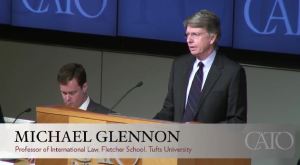Alarm over the growth of the national security state seems to wane among liberals when Democrats are in the White House but the sheer magnitude of the enterprise should be of concern to all no matter which party is in nominal control of the executive branch.

When Thomas Jefferson was president, “the entire executive branch consisted of 132 people,” Michael Glennon, a law professor at Tufts University, said recently at the Cato Institute. “The White House staff consisted of one person: Jefferson’s personal secretary.”
Today, on the national security side alone, “This little apparatus that Truman set up consists of 46 different federal departments and agencies that operate with over 2,000 private companies and at 10,000 locations around the United States,” Glennon pointed out. “The exact size of its manpower is not clear.”
“There are over 5 million Americans who have security clearances and 3 million Americans who have top secret clearances.” He said, “This is the apparatus that dominates the formulation and execution of national security policy” and it no longer resides in the White House.
No doubt these national security experts are “smart, hard-working, dedicated, public spirit[ed], patriotic individuals,” but Glennon added that “They respond to incentives that are embedded within the American legal and political system.”
“One of those incentives is to inflate risks,” he said. “They have an incentive to exaggerate threats the United States is facing.” For example, “if they underestimate the risk, they get blamed. If they overestimate the risk…more manpower and more budget.”
Glennon called these experts “information gluttons and information misers” because they “grab as much power as possible” but then “don’t share and the consequences that there are no independent means to assess their evaluations.” These experts “tend to resist accountability by Madisonian institutions” such as Congress and the president, because of a “superiority,” complex-type of mindset of that comes from having to deal with oversight from “amateurs.” Glennon added, “This mindset continues from one administration to the next” and they “continue to support the status quo.” It is all about “making your bosses look good.”
And, “the net effect for all this is there is no need to confront the president on these sorts of issues,” Glennon noted. Many government programs “are on autopilot,” he said, and congressional oversight committees have their hands tied. A major problem with these committees, according to Glennon, is that they get their information from the intelligence community, but intelligence officials withhold information.










